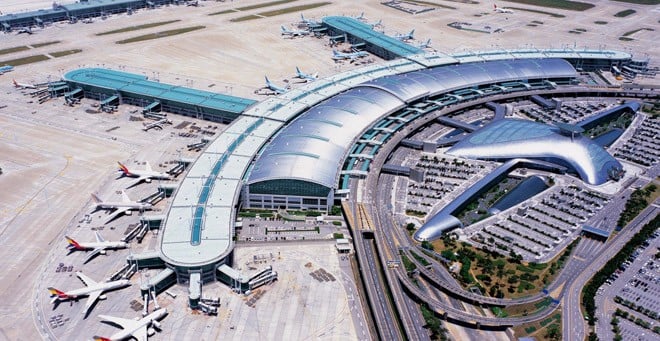

The journey from Islamabad to South Korea’s Incheon International Airport via Bangkok-Hong Kong was comfortable and interesting. The impression one gathers while landing at the airport gives one a glimpse of the country’s socio-economic development. The first glance at South Korea developmental miracles gave an impression that all round development is possible if the principle of "implementation and execution of any policy in its true spirit and letter" is adhered to.
This commitment and will has facilitated transformation of South Korea from a backward/agriculture country to a modern and high tech state. It would not be an exaggeration if one calls Korea a "Kingdom of Cell Phone and Super Speed Internet". South Korea had 95 US dollars per capita income in early 1960s which has risen to 22,000 US dollars in 2012. The only difference amongst the poster-children of global capitalism -- South Korea, Taiwan, Singapore, Hong Kong Malaysia and Thailand -- is that South Korea unlike others does not have political or economic problems except the jerk of 1997 financial crisis and the fallout of 2008 global economic crisis.
Successful and sustainable upward journey of South Korea sailed smoothly owing to people-oriented policies focused on (a) motivating the people to eagerly contribute to rapid economic growth and (ii) government’s sincere commitment. These two contributors made possible the economic turnaround in the destiny of a hopeless and aid-dependent country to a donor country.
Certainly, Pakistan shares the Korean success as the latter emulated Pakistan’s first five years plan. The two countries enjoy excellent bilateral relations established in 1968 which cover political, economic, trade, cultural, military and educational fields. 36 MoUs between the two partners is a manifestation of strong ties based on mutual interests and trust.
Pak-Korea bilateral trade was just 94 million US dollars in 1980s which has risen to 1.55 billion dollars in 2013. Korean companies have experience in major infrastructure projects like roads, chemical plants, tunnels, hydro power projects and thermal power projects.
Now back to South Korea. This country of mountains and tunnels overcame the travails of 1945-60 that covers World War-II, separation of Korean Peninsula in 1948 and Korea War (1950-53). And accelerated industrialisation was kick started under the dynamic leadership of President General Park Chung-Hee. Though President Park took the reign of powers through a military coup on 16th May, 1961, he is still considered the moving spirit behind the Asian Tiger’s unbelievable development.
Without doubt, each country has its own socio-economic characteristics and historical background to design its development strategy. Development policies that have led to economic uplift in one country cannot be applied in other country in toto. Developing countries, including Pakistan, can feasibly replicate Seoul’s development strategy to achieve pragmatic results.
During our stay in Seoul, South Korean intellectuals and high officials often mentioned their "First Five-Year Plan" authored by prominent Pakistani Economist Dr Mahboob-ul-Haq. The Korean opinion makers also informed that President Park’s development strategies were continued with demand driven changes. In the aftermath of sustainable economic development, today Korea by virtue of its economy is the 15th largest country in the world.
South Korea’s economic development strategies are materialised by adoption of export-oriented policy in 1960, given its small domestic market, lack of natural resources and abundant labour. The Korean economy took off in 1963 registering a rapid economic growth. The sustainable economic development is attributed to (a) top leadership’s unwavering support, (b) entrepreneurs high spirit to penetrate the world market, (c) favourable global trading environment, (d) rising domestic saving and investment.
Pakistan is a developing country facing the formidable task to ensure economic revival in a peaceful environment. The serpent of terrorism and law and order situation is the main hurdle to materialise the task. The economic situation is causing serious social polarisation. It is encouraging that the grant of duty-free access to Pakistani exports-mostly textile and clothing to EU’s 27 member countries under the GSP Plus scheme is likely to boost economic and investment opportunities in the country, if all stakeholders play their role properly.
Pakistan gives special importance to its relations with South Korea in the context of the "Vision East Asia Policy". South Korean investors are very much active in Pakistan in water and power sector projects. They are keen to invest more in Pakistan. Their expertise in the field of power sector could assist Pakistan in setting up joint ventures along with latest technology transfers to the benefits of both sides. Pakistan has offered many incentives to the Korean investors including setting up of a Special Economic Zone.
The current volume of bilateral trade is less that what it should be. Pakistan is a country of 180 million vibrant middle class people having an increasing purchasing power and possesses a huge reservoir of highly skilled and disciplined human resource. In addition, foreign exchange rate parity makes the local fabrication and manufacturing very attractive and competitive for exports. Therefore, Pakistan-Korea’s economic partnership could prove equally beneficial to both sides provided the true potential is exploited to optimum level.